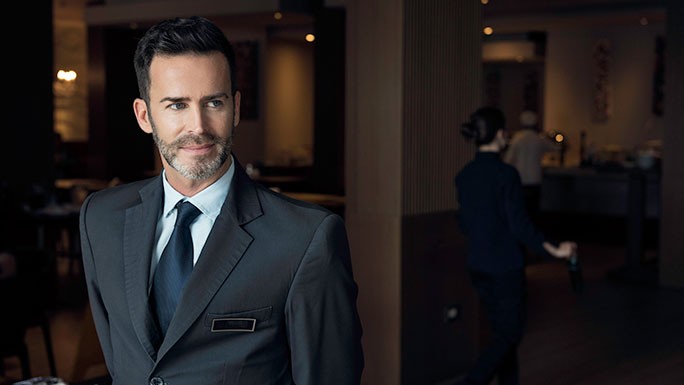The importance of communication in the tourism industry cannot be overstated. Communication in the tourism industry is the cornerstone of creating memorable experiences for travelers exploring destinations like vibrant Vietnam. SIXT.VN understands this and offers comprehensive travel solutions enhanced by clear and effective communication at every touchpoint. Our services provide seamless experiences, from airport transfers to curated tours, ensuring your journey is unforgettable. Effective communication also helps address cultural communication barriers, manage customer expectations, and promote local culture and tourism products, making your trip smoother and more enjoyable.
1. Understanding the Vital Role of Communication in Tourism
Why is communication important in tourism? Communication plays a pivotal role in the tourism industry, serving as the linchpin for seamless operations and exceptional customer experiences. It’s the foundation upon which trust is built, expectations are managed, and lasting memories are created.
The Essence of Communication in Tourism
- Building Rapport: Effective communication helps establish a strong rapport with tourists, creating a welcoming and trustworthy environment.
- Conflict Resolution: Clear and empathetic communication is crucial for resolving conflicts and addressing concerns promptly and efficiently.
- Enhanced Guest Experience: Positive and informative communication significantly enhances the overall guest experience, leading to satisfaction and loyalty.
According to a study by the United Nations World Tourism Organization (UNWTO), destinations that prioritize effective communication strategies witness higher tourist satisfaction rates and increased revisits.
Communication as a Competitive Advantage
In today’s competitive tourism landscape, businesses must differentiate themselves through exceptional customer service. Effective communication is a key differentiator, allowing companies to understand and cater to the diverse needs of travelers.
- Personalized Service: Tailoring communication to individual preferences enhances the perception of personalized service, fostering stronger customer relationships.
- Information Accessibility: Providing clear, accessible information about services, attractions, and local customs empowers tourists to make informed decisions and enjoy their travels.
- Crisis Management: In times of crisis, such as natural disasters or health emergencies, clear and timely communication is essential for ensuring tourist safety and minimizing disruption.
SIXT.VN recognizes the paramount importance of effective communication in the tourism sector, integrating it into every facet of our operations to deliver unparalleled service and support to our valued customers.
 tourist vietnam
tourist vietnam
2. Unveiling the Significance of Communication Skills in Tourism
Why are communication skills essential in the tourism industry? Strong communication skills are indispensable in the tourism industry, impacting every interaction from initial inquiries to post-trip feedback, and are paramount for delivering exceptional service.
Key Communication Skills for Tourism Professionals
- Active Listening: Truly understanding the needs and preferences of travelers.
- Clear and Concise Communication: Providing accurate and easily understandable information.
- Empathy and Patience: Addressing concerns with understanding and a willingness to assist.
- Adaptability: Tailoring communication styles to diverse cultural backgrounds and individual preferences.
How Communication Skills Drive Success in Tourism
- Customer Satisfaction: Effective communication ensures that tourists feel valued and understood, leading to higher satisfaction levels.
- Repeat Business: Positive interactions and clear communication encourage travelers to return and recommend services to others.
- Problem Resolution: Skilled communicators can quickly and effectively resolve issues, turning potential complaints into opportunities for customer loyalty.
SIXT.VN invests in training our staff to develop exceptional communication skills, ensuring that every interaction with our customers is positive, informative, and tailored to their specific needs, enhancing their overall travel experience in Vietnam.
3. Exploring the Multifaceted Benefits of Effective Communication Skills
What benefits do strong communication skills bring to the tourism industry? The benefits of effective communication skills in the tourism industry are multifaceted, contributing to enhanced customer experiences, improved operational efficiency, and a positive brand reputation.
Direct Advantages of Effective Communication
- Increased Customer Loyalty: Clear and empathetic communication fosters trust, leading to increased customer loyalty and repeat business.
- Enhanced Operational Efficiency: Smooth communication between staff members ensures seamless coordination and efficient service delivery.
- Positive Brand Image: Exceptional communication contributes to a positive brand image, attracting new customers and strengthening existing relationships.
According to a study by Tourism Review, companies with strong communication strategies experience a 20% increase in customer retention rates compared to those with poor communication.
Specific Benefits for Tourism Professionals
- Career Advancement: Strong communication skills open doors to leadership positions and career advancement opportunities.
- Improved Teamwork: Effective communication fosters collaboration and teamwork, creating a positive and productive work environment.
- Conflict Resolution: Skilled communicators are better equipped to handle difficult situations and resolve conflicts, minimizing disruption and maintaining customer satisfaction.
SIXT.VN prioritizes the development of effective communication skills among our employees, recognizing that it is a critical factor in delivering exceptional service and fostering long-term customer relationships. We ensure that every interaction reflects our commitment to quality and customer satisfaction.
4. Standing Out: Communication Skills in Hospitality Careers
How can strong communication skills help you excel in a hospitality career? Strong communication skills are essential for standing out in hospitality careers, enabling professionals to build rapport with guests, manage teams effectively, and navigate challenging situations with grace.
Key Attributes of Communicative Hospitality Professionals
- Active Listening: Paying close attention to guest needs and concerns.
- Clear Articulation: Expressing information in a concise and easily understandable manner.
- Empathy: Showing understanding and compassion towards guest experiences.
- Cultural Sensitivity: Respecting and adapting to diverse cultural backgrounds.
Advantages for Hospitality Job Candidates
- Enhanced Employability: Demonstrating strong communication skills makes candidates more attractive to employers.
- Improved Customer Service: Effective communication leads to better customer service and higher guest satisfaction.
- Effective Teamwork: Clear communication fosters collaboration and a positive work environment.
SIXT.VN’s Commitment to Communication Excellence
At SIXT.VN, we seek individuals with outstanding communication abilities. We provide ongoing training and development opportunities to enhance these skills, ensuring that our team can deliver exceptional service and build lasting relationships with our customers. We strive to make every interaction a testament to our dedication to quality and customer satisfaction.
 communication tourism
communication tourism
5. The Rising Demand for Communicative Talents in Tourism
Why are employers increasingly seeking communicative talents? Employers are increasingly seeking communicative talents in tourism to meet the demands of a globalized industry and cater to diverse customer needs, making clear and effective communication a top priority.
Drivers of Demand for Communication Skills
- Globalization: The need to interact with guests from various cultural backgrounds.
- Technology: The importance of digital communication channels and online customer service.
- Customer Expectations: The demand for personalized and responsive service.
Essential Communication Skills in the Modern Tourism Workplace
- Verbal Communication: Clear and engaging face-to-face and telephone interactions.
- Written Communication: Effective email correspondence and online messaging.
- Non-Verbal Communication: Understanding body language and cultural cues.
SIXT.VN recognizes the growing importance of communication skills in the tourism sector. We invest in training our staff to excel in all forms of communication, ensuring that they can effectively engage with customers from around the world. We prioritize cultural sensitivity and adaptability, enabling our team to deliver exceptional service and build lasting relationships.
6. The Importance of Effective Communication for Hotel Managers
Why is effective communication crucial for hotel managers? Effective communication is paramount for hotel managers, as it enables them to lead teams, manage guest expectations, and ensure smooth operations, all contributing to the overall success of the establishment.
Key Roles of Hotel Managers in Communication
- Team Leadership: Clearly communicating goals, expectations, and feedback to staff.
- Guest Relations: Building rapport with guests, addressing concerns, and ensuring satisfaction.
- Operational Efficiency: Coordinating tasks, resolving issues, and maintaining smooth workflows.
Communication Strategies for Hotel Managers
- Regular Meetings: Conducting team meetings to share updates, gather feedback, and address concerns.
- Open-Door Policy: Encouraging staff and guests to approach them with questions and issues.
- Active Listening: Paying close attention to the needs and concerns of both staff and guests.
According to Cornell University’s School of Hotel Administration, hotels with managers who prioritize effective communication experience higher employee satisfaction rates and improved guest reviews.
SIXT.VN ensures that our hotel partners emphasize effective communication at all levels of management. We provide training and resources to help hotel managers enhance their communication skills, enabling them to lead their teams effectively and deliver exceptional guest experiences. We believe that clear and open communication is the foundation of a successful and thriving hotel operation.
7. Essential Skills for Success in Hospitality Management
What skills are vital for excelling in hospitality management? Excelling in hospitality management requires a diverse set of skills, with communication skills being among the most vital, enabling professionals to lead teams, manage customer interactions, and ensure smooth operations.
Core Skills for Hospitality Managers
- Communication: Effectively conveying information, listening actively, and resolving conflicts.
- Customer Service: Providing exceptional service and addressing guest needs with empathy and efficiency.
- Leadership: Motivating and guiding teams to achieve common goals.
- Problem-Solving: Identifying and resolving issues quickly and effectively.
- Organization: Managing tasks, prioritizing responsibilities, and ensuring smooth workflows.
How Communication Skills Enhance Hospitality Management
- Improved Team Performance: Clear communication fosters collaboration and a positive work environment, leading to improved team performance.
- Enhanced Guest Satisfaction: Effective communication ensures that guests feel valued and understood, resulting in higher satisfaction levels.
- Effective Conflict Resolution: Skilled communicators can quickly and effectively resolve issues, minimizing disruption and maintaining customer loyalty.
SIXT.VN recognizes the importance of these core skills in hospitality management. We partner with hotels and resorts that prioritize the development of these skills among their staff. We ensure that our customers receive exceptional service from well-trained professionals who excel in communication, customer service, leadership, problem-solving, and organization.
8. Exploring Two-Way Communication in the Hospitality Industry
What does two-way communication entail in hospitality? Two-way communication in hospitality involves a continuous exchange of information between staff and guests, fostering understanding, addressing concerns, and enhancing the overall experience.
Key Elements of Two-Way Communication
- Active Listening: Paying close attention to guest needs and concerns.
- Open Dialogue: Encouraging guests to share their feedback and suggestions.
- Responsive Action: Addressing issues promptly and effectively.
- Empathy: Showing understanding and compassion towards guest experiences.
Benefits of Two-Way Communication
- Improved Customer Satisfaction: Guests feel valued and understood when their voices are heard.
- Enhanced Service Quality: Feedback from guests helps identify areas for improvement.
- Stronger Relationships: Open communication fosters trust and loyalty.
SIXT.VN values two-way communication as a cornerstone of our customer service philosophy. We actively solicit feedback from our customers through surveys, reviews, and direct interactions. We use this feedback to continuously improve our services and ensure that we are meeting the evolving needs of our customers. We believe that open and transparent communication is essential for building strong and lasting relationships.
9. Tips for Effective Communication in Hotel Management
How can hotel managers enhance their communication skills? Hotel managers can enhance their communication skills by practicing active listening, providing clear instructions, and fostering open dialogue, creating a positive and productive environment for both staff and guests.
Strategies for Improving Communication
- Active Listening: Pay close attention to what others are saying, ask clarifying questions, and show empathy.
- Clear Instructions: Provide concise and easy-to-understand instructions, avoiding jargon and ambiguity.
- Open Dialogue: Encourage staff and guests to share their feedback and suggestions.
- Positive Reinforcement: Recognize and reward effective communication among staff members.
- Training and Development: Provide ongoing training and development opportunities to enhance communication skills.
Benefits of Improved Communication
- Increased Team Performance: Clear communication fosters collaboration and a positive work environment, leading to improved team performance.
- Enhanced Guest Satisfaction: Effective communication ensures that guests feel valued and understood, resulting in higher satisfaction levels.
- Effective Conflict Resolution: Skilled communicators can quickly and effectively resolve issues, minimizing disruption and maintaining customer loyalty.
SIXT.VN supports our hotel partners in their efforts to enhance communication at all levels of their operations. We provide resources and training materials to help hotel managers improve their communication skills and foster a culture of open dialogue and collaboration. We believe that effective communication is the key to creating a successful and thriving hotel environment.
 communication hotel management
communication hotel management
10. Ready to Elevate Your Hospitality Career?
How does improving communication skills boost your hospitality career? Improving communication skills is essential for elevating your hospitality career, enabling you to excel in customer service, team leadership, and problem-solving, opening doors to new opportunities and advancements.
Ways to Enhance Your Communication Skills
- Attend Workshops and Seminars: Participate in communication training programs to learn new techniques and strategies.
- Practice Active Listening: Make a conscious effort to pay attention to what others are saying and show empathy.
- Seek Feedback: Ask colleagues and mentors for feedback on your communication skills and areas for improvement.
- Read Books and Articles: Explore resources on effective communication techniques and best practices.
- Join Professional Organizations: Network with other hospitality professionals and learn from their experiences.
Career Benefits of Strong Communication Skills
- Improved Customer Service: Provide exceptional service and build lasting relationships with guests.
- Effective Team Leadership: Motivate and guide teams to achieve common goals.
- Enhanced Problem-Solving: Quickly and effectively resolve issues and maintain customer satisfaction.
- Career Advancement: Open doors to leadership positions and new opportunities.
SIXT.VN is committed to supporting individuals in their pursuit of excellence in the hospitality industry. We offer resources and training materials to help professionals enhance their communication skills and advance their careers. We believe that strong communication skills are essential for success in the dynamic and rewarding world of hospitality. Contact us at Hotline/WhatsApp: +84 986 244 358 or visit our Website: SIXT.VN. Address: 260 Cau Giay, Hanoi, Vietnam.
11. Understanding Key Objectives of Hotel Management through Communication
How does communication contribute to achieving hotel management objectives? Communication is central to achieving hotel management objectives, ensuring guest satisfaction, smooth operations, and a positive brand image, all of which are critical for success in the competitive hospitality industry.
Key Objectives of Hotel Management
- Guest Satisfaction: Providing exceptional service and meeting guest needs.
- Operational Efficiency: Managing resources and processes effectively.
- Profitability: Maximizing revenue and controlling costs.
- Brand Reputation: Building a positive image and attracting new customers.
How Communication Supports These Objectives
- Guest Satisfaction: Effective communication ensures that guests feel valued and understood, leading to higher satisfaction levels.
- Operational Efficiency: Clear communication between staff members ensures seamless coordination and efficient service delivery.
- Profitability: Positive guest experiences and efficient operations contribute to increased revenue and profitability.
- Brand Reputation: Exceptional communication enhances the brand image and attracts new customers.
SIXT.VN recognizes the importance of these objectives in hotel management. We partner with hotels and resorts that prioritize effective communication at all levels of their operations. We ensure that our customers receive exceptional service from well-trained professionals who excel in communication, customer service, and operational efficiency.
12. Step-by-Step Guide: Improving Communication in the Tourism Sector
How can the tourism sector improve communication practices? Improving communication in the tourism sector requires a multi-faceted approach, including training, technology integration, and a focus on customer feedback, leading to enhanced guest experiences and operational efficiency.
Practical Steps for Improvement
- Training Programs: Provide regular training programs for staff on effective communication techniques.
- Technology Integration: Utilize technology tools such as chatbots and mobile apps to enhance communication.
- Customer Feedback: Actively solicit and respond to customer feedback.
- Cultural Sensitivity: Promote cultural sensitivity and awareness among staff members.
- Clear Signage: Ensure clear and informative signage in tourist areas.
Benefits of Enhanced Communication
- Increased Customer Satisfaction: Guests feel valued and understood when their needs are met.
- Improved Efficiency: Smooth communication streamlines operations and reduces errors.
- Positive Brand Image: Exceptional communication enhances the reputation of the tourism sector.
SIXT.VN is committed to supporting the improvement of communication practices in the tourism sector. We partner with hotels, resorts, and other tourism-related businesses that prioritize effective communication. We provide resources and training materials to help them enhance their communication skills and deliver exceptional service to their customers.
 hospitality degree
hospitality degree
13. Frequently Asked Questions (FAQs) About Communication in Tourism
What are common questions about communication in tourism? Here are some frequently asked questions about communication in the tourism industry to clarify its importance and practical applications.
FAQ 1: Why is effective communication important in the tourism industry?
Effective communication is crucial in the tourism industry because it helps build rapport with guests, resolve conflicts, and create a positive overall guest experience.
FAQ 2: What are the key communication skills needed for tourism professionals?
Key communication skills include active listening, clear and concise communication, empathy, and adaptability to diverse cultural backgrounds.
FAQ 3: How can strong communication skills help advance a career in hospitality?
Strong communication skills enhance employability, improve customer service, foster effective teamwork, and open doors to leadership positions.
FAQ 4: What role does two-way communication play in the hospitality industry?
Two-way communication fosters understanding, addresses concerns, and enhances the overall experience by involving continuous information exchange between staff and guests.
FAQ 5: What strategies can hotel managers use to improve communication with their staff?
Hotel managers can improve communication by conducting regular meetings, maintaining an open-door policy, practicing active listening, and providing clear instructions.
FAQ 6: How can technology be leveraged to enhance communication in the tourism sector?
Technology tools such as chatbots, mobile apps, and online messaging can enhance communication by providing quick and convenient access to information and customer service.
FAQ 7: How does cultural sensitivity impact communication in tourism?
Cultural sensitivity ensures that communication is respectful and appropriate for diverse cultural backgrounds, enhancing the guest experience and fostering positive relationships.
FAQ 8: What are the benefits of investing in communication training for tourism staff?
Investing in communication training leads to improved customer service, enhanced teamwork, and increased customer satisfaction.
FAQ 9: How can tourism businesses gather and utilize customer feedback to improve communication?
Tourism businesses can gather feedback through surveys, reviews, and direct interactions, and use this information to continuously improve their communication practices.
FAQ 10: What is the role of non-verbal communication in the tourism industry?
Non-verbal communication, such as body language and facial expressions, plays a crucial role in conveying empathy and understanding, enhancing the overall guest experience.
SIXT.VN is dedicated to providing exceptional service and support to our customers. We believe that clear and effective communication is the key to creating memorable travel experiences. Contact us today to learn more about our services and how we can help you plan your next adventure. Address: 260 Cau Giay, Hanoi, Vietnam. Hotline/Whatsapp: +84 986 244 358. Website: SIXT.VN.



